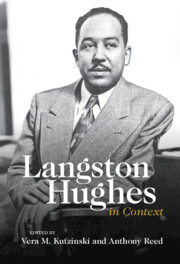Book contents
- Langston Hughes in Context
- Langston Hughes in Context
- Copyright page
- Contents
- Contributors
- Abbreviations
- Introduction
- Part I Singing America
- Part II The Global Langston Hughes
- Chapter 12 Langston Hughes and the Haitian Revolution
- Chapter 13 Taking Louise Bennett Seriously
- Chapter 14 Langston Hughes and Mexico
- Chapter 15 Langston Hughes in Spain
- Chapter 16 Langston Hughes in Cuba and South America
- Chapter 17 Langston Hughes, Colonialism, and Decolonization
- Chapter 18 Langston Hughes and Cultural Diplomacy
- Chapter 19 Langston Hughes in the Soviet Union
- Chapter 20 Translating Blackness
- Chapter 21 Langston Hughes and the Shanghai Jazz Scene
- Chapter 22 Langston Hughes’s Short Fiction in 1930s Korea
- Part III Afterlives
- Index
Chapter 22 - Langston Hughes’s Short Fiction in 1930s Korea
from Part II - The Global Langston Hughes
Published online by Cambridge University Press: 10 November 2022
- Langston Hughes in Context
- Langston Hughes in Context
- Copyright page
- Contents
- Contributors
- Abbreviations
- Introduction
- Part I Singing America
- Part II The Global Langston Hughes
- Chapter 12 Langston Hughes and the Haitian Revolution
- Chapter 13 Taking Louise Bennett Seriously
- Chapter 14 Langston Hughes and Mexico
- Chapter 15 Langston Hughes in Spain
- Chapter 16 Langston Hughes in Cuba and South America
- Chapter 17 Langston Hughes, Colonialism, and Decolonization
- Chapter 18 Langston Hughes and Cultural Diplomacy
- Chapter 19 Langston Hughes in the Soviet Union
- Chapter 20 Translating Blackness
- Chapter 21 Langston Hughes and the Shanghai Jazz Scene
- Chapter 22 Langston Hughes’s Short Fiction in 1930s Korea
- Part III Afterlives
- Index
Summary
This chapter examines Korean translations of Langston Hughes’s short fiction in the 1930s to trace Hughes’s inspiration for the willful violation of social order. In the mid-1930s when Korea was under Japanese rule (1910–45), Jong-su Yi introduced Hughes’s leftist vision to a Korean audience by translating “Mother and Child” and “Cora Unashamed.” The medium of the magazine facilitated this global dissemination of Hughes. The act of translating pieces from contemporaneous non-Japanese-language periodicals was Korean intellectuals’ deliberate means to keep abreast of proletarian developments in other countries while redressing Korea’s reliance on the colonizer’s cultural resources. By focusing on Hughes’s depictions of African American workers and their interracial relationships, Yi encouraged Korean readers to imagine living otherwise when adhering to the system of oppression and exploitation was the normative condition. Yi’s subversive practice of translation expands Hughes’s radicalism as manifested in racial and sexual transgression.
- Type
- Chapter
- Information
- Langston Hughes in Context , pp. 232 - 242Publisher: Cambridge University PressPrint publication year: 2022

